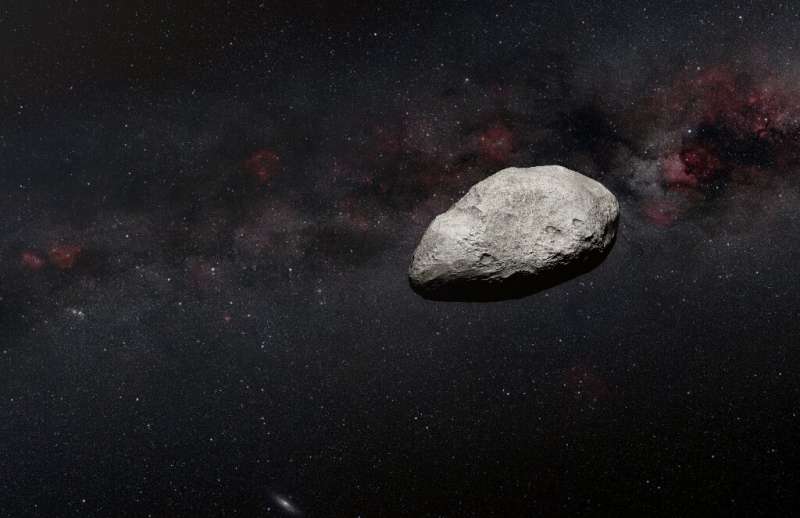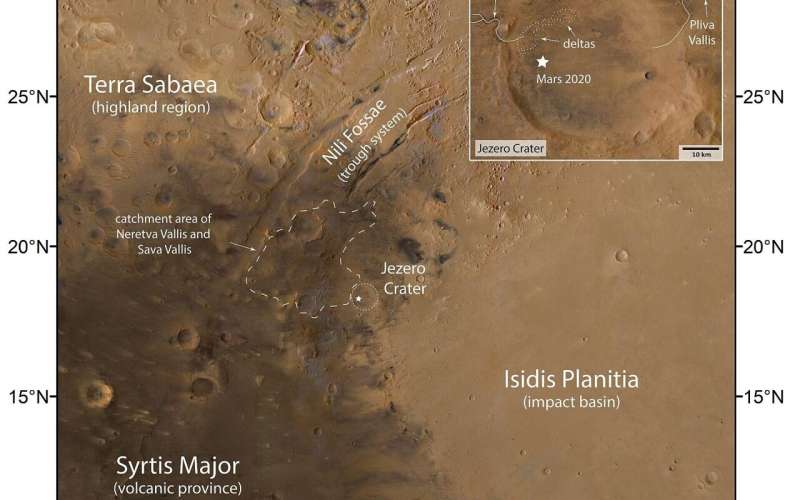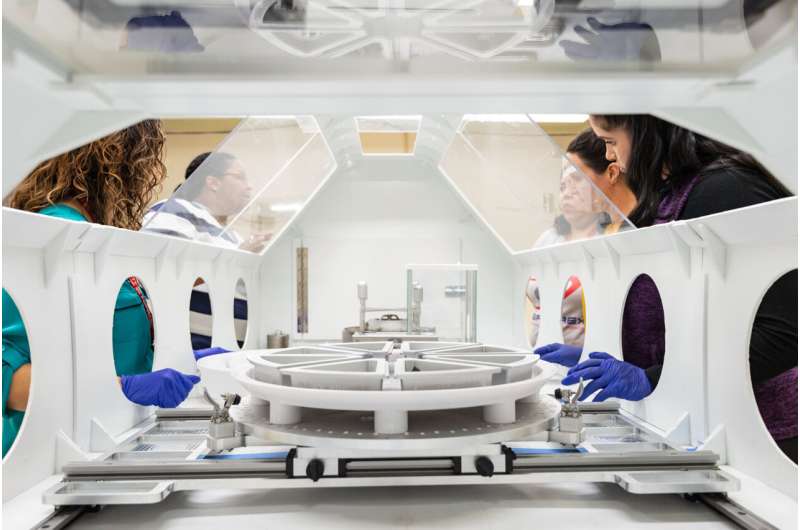
Copernical Team
An explaination for unusual radar signatures in the outer solar system
 A study co-authored by Southwest Research Institute Senior Research Scientist Dr. Jason Hofgartner explains the unusual radar signatures of icy satellites orbiting Jupiter and Saturn. Their radar signatures, which differ significantly from those of rocky worlds and most ice on Earth, have long been a vexing question for the scientific community.
"Six different models have been published in
A study co-authored by Southwest Research Institute Senior Research Scientist Dr. Jason Hofgartner explains the unusual radar signatures of icy satellites orbiting Jupiter and Saturn. Their radar signatures, which differ significantly from those of rocky worlds and most ice on Earth, have long been a vexing question for the scientific community.
"Six different models have been published in Hubble monitors changing weather and seasons at Jupiter and Uranus
 Ever since its launch in 1990, NASA's Hubble Space Telescope has been an interplanetary weather observer, keeping an eye on the largely gaseous outer planets and their ever-changing atmospheres. NASA spacecraft missions to the outer planets have given us a close-up look at these atmospheres, but Hubble's sharpness and sensitivity keeps an unblinking eye on a kaleidoscope of complex activities ov
Ever since its launch in 1990, NASA's Hubble Space Telescope has been an interplanetary weather observer, keeping an eye on the largely gaseous outer planets and their ever-changing atmospheres. NASA spacecraft missions to the outer planets have given us a close-up look at these atmospheres, but Hubble's sharpness and sensitivity keeps an unblinking eye on a kaleidoscope of complex activities ov UTEP joins project to 3D print batteries from lunar and Martian soil
 The University of Texas at El Paso has joined a project led by NASA to leverage 3D-printing processes with the aim of manufacturing rechargeable batteries using lunar and Martian regolith, which is the top layer of materials that covers the surface of the moon and Mars.
"UTEP is a national leader in additive manufacturing for space applications," said Kenith Meissner, Ph.D., dean of the UT
The University of Texas at El Paso has joined a project led by NASA to leverage 3D-printing processes with the aim of manufacturing rechargeable batteries using lunar and Martian regolith, which is the top layer of materials that covers the surface of the moon and Mars.
"UTEP is a national leader in additive manufacturing for space applications," said Kenith Meissner, Ph.D., dean of the UT SpaceX launches 56 Starlink satellites from Florida
 SpaceX launched 56 Starlink satellites from Florida's Cape Canaveral Space Force Station Friday.
The satellites were carried into low-Earth orbit aboard a Falcon 9 rocket which lifted off at 11:43 a.m. EDT.
The reusable first stage booster separated shortly after liftoff and returned to Earth where it landed on the "Shortfall of Gravitas" drone ship in the Atlantic Ocean approxim
SpaceX launched 56 Starlink satellites from Florida's Cape Canaveral Space Force Station Friday.
The satellites were carried into low-Earth orbit aboard a Falcon 9 rocket which lifted off at 11:43 a.m. EDT.
The reusable first stage booster separated shortly after liftoff and returned to Earth where it landed on the "Shortfall of Gravitas" drone ship in the Atlantic Ocean approxim The race is on for Ingenuity and Perseverance to stay the distance
 The Perseverance rover spent the first two Earth years of its mission on Mars driving and sampling within Jezero crater. As anticipated, Jezero was found to be rich with interesting geological features, and the rover used 21 of its precious 43 sample tubes in the region. The rover wrapped up this science campaign by dropping 10 of these samples in a backup depot area for retrieval by a future mi
The Perseverance rover spent the first two Earth years of its mission on Mars driving and sampling within Jezero crater. As anticipated, Jezero was found to be rich with interesting geological features, and the rover used 21 of its precious 43 sample tubes in the region. The rover wrapped up this science campaign by dropping 10 of these samples in a backup depot area for retrieval by a future mi NASA prepares for historic asteroid sample delivery on Sept 24
 NASA's OSIRIS-REx spacecraft is cruising back to Earth with a sample it collected from the rocky surface of asteroid Bennu. When its sample capsule parachutes down into the Utah desert on Sept. 24, OSIRIS-REx will become the United States' first-ever mission to return an asteroid sample to Earth.
After seven years in space, including a nail-biting touchdown on Bennu to gather dust and rock
NASA's OSIRIS-REx spacecraft is cruising back to Earth with a sample it collected from the rocky surface of asteroid Bennu. When its sample capsule parachutes down into the Utah desert on Sept. 24, OSIRIS-REx will become the United States' first-ever mission to return an asteroid sample to Earth.
After seven years in space, including a nail-biting touchdown on Bennu to gather dust and rock Rocket Lab launches 35th Electron 7 days after previous launch
 Rocket Lab USA, Inc. (Nasdaq: RKLB) has launched its 35th Electron rocket, deploying two multi-spectral Gen-2 satellites to low Earth orbit for BlackSky (NYSE: BKSY) through launch services provider Spaceflight, Inc. The mission took place just seven days following the Company's previous Electron mission from Launch Complex 2 in Virginia, setting a new company record for fastest turnaround betwe
Rocket Lab USA, Inc. (Nasdaq: RKLB) has launched its 35th Electron rocket, deploying two multi-spectral Gen-2 satellites to low Earth orbit for BlackSky (NYSE: BKSY) through launch services provider Spaceflight, Inc. The mission took place just seven days following the Company's previous Electron mission from Launch Complex 2 in Virginia, setting a new company record for fastest turnaround betwe Large asteroid to zoom between Earth and Moon

A large asteroid will safely zoom between Earth and the Moon on Saturday, a once-in-a-decade event that will be used as a training exercise for planetary defense efforts, according to the European Space Agency.
The asteroid, named 2023 DZ2, is estimated to be 40 to 70 meters (130 to 230 feet) wide, roughly the size of the Parthenon, and big enough to wipe out a large city if it hit our planet.
At 19:49 GMT on Saturday it will come within a third of the distance from the Earth to the Moon, said Richard Moissl, the head of the ESA's planetary defense office.
Though that is "very close", there is nothing to worry about, he told AFP.
Fly around Jezero Crater on Mars in this new video

There's a reason Jezero Crater was chosen as the landing site for the Perseverance Rover: it is considered one of the likeliest places to find any evidence if Mars was ever habitable for long periods of time. In this great new flyby video from ESA, you can get a birds-eye look at Perseverance's home.
Created from data ESA's Mars Express and NASA's Mars Reconnaissance Orbiter, the video takes you on an aerial tour of the crater. From this perspective, you can see the water features in this ancient impact crater and understand why this was considered one of the best places to explore Mars.
Perseverance landed in Jezero crater in February 2021. The diverse rocks and mineralogy found in and around Jezero crater tell the story of Mars' complex geological history, which Perseverance is working to study and reveal. The roughly 45-km-wide crater is found on the border between the ancient region of Terra Sabaea—which contains rocks of up to 4.1 billion years old—and the younger Isidis Planitia basin, which formed via asteroid impact.
NASA prepares for historic asteroid sample delivery on Sept. 24


